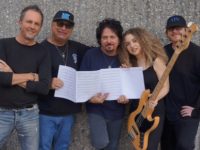Joe Cocker represents the last of the great musical interpreters, an instant throwback in the singer-songwriter era who was still doing wondrous things with others words into a new century. By the time he died, at age 70 after a long cancer battle, he’d found his own place in that pantheon.
With a valuable assist from Leon Russell, he’d made his bones as a great funkifier of pop and rock tunes at the turn of the 1970s — transforming then-recent songs like the Beatles’ “With A Little Help From My Friends,” Traffic’s “Feelin’ Alright” and Bob Dylan’s “Just Like A Woman” (not to mention improbably dated chestnuts like “Cry Me A River”) into these grease-popping, heart-shattering meltdowns.
He rose to initial fame, both as a singer and as a prop for stand-up comedians like John Belushi, during a robust moment at Woodstock, and to a kind of ribald infamy on the subsequent Mad Dogs and Englishmen tour. It seemed, at first anyway, to come easy for Joe.
“It wasn’t as nerve wracking as people might think,” Joe Cocker sideman Henry McCullough told us in an exclusive Something Else! Sitdown, remembering Woodstock. “We knew that this was a very special event. In that way, it was stunning. You were not that far from the front row, and there were thousands of people there. And it ended up being one of the strongest points in the movie. For the event itself, though, we flew in from 20 miles away in a helicopter. You play and an hour later you are whisked out and then off to somewhere else.”
But Joe Cocker’s biggest hit, an impossibly slowed-down 1974 No. 5 take on “You Are So Beautiful” written by Billy Preston and the Beach Boys’ Dennis Wilson, seemed to change him in improbable ways.
What came next were a series of cellophane-slick plastic soul records through the 1990s, most of them — save for 1986’s “You Can Leave Your Hat On,” a 1987 take on Ray Charles’ “Unchain My Heart” and 1992’s “When the Night Comes,” among few others — sunk by a series of synthesized adult-contemporary gimmicks. Substance abuse, and off-stage antics, tended to obscure his gift. Later, after cleaning up, Cocker tried unplugging with 1996’s Organic, unfortunately to little notice.
Still, people like Dave Mason — who wrote “Feelin’ Alright” as a member of Traffic — knew well the power of Joe Cocker’s interpretive genius. He could, with one craggly bark, lay lasting claim to any track.
“Well, yeah — the song is about not feeling too good myself! That’s what’s the song’s about. It’s not really about feeling alright, at all,” Mason told us, laughing. “But, that being said, without Joe’s version, it would never have gotten the enormous amount of attention it got. So, you know, it’s open to interpretation.”
See, Joe Cocker’s main instrument, that boozy, crackling voice, retained until the end so much of its charm, so much of its crying power and dangerous menace, that you just knew he had the capacity to make exciting music again.
2004’s Heart and Soul and 2007’s Hymn for My Soul certainly hinted at a complete return to form, though perhaps only in half measure because Cocker dug so deeply into his baby boomer roots — singing a host of older tracks from R&B and pop/rock stars who came of age in the 1950s and ’60s.
Then came 2011’s “Hard Knocks,” a crackling track that illustrated what he could do with an of-the-moment reworking from the modern era. This slab of slow-cooked soul, written by a three-person team that included Marc Broussard for the album of the same name, defined Joe Cocker’s third-act reemergence. Cocker had made a bold return to the nasty R&B that made his first recordings so essential, having lost none of his ability to bray along with a robust, whiskey-soaked howl. And he’d claimed another lyric sheet for his own.
That’s the way we’ll remember him tonight.
- How Deep Cuts on ‘Music From Big Pink’ Underscore the Band’s Triumph - July 31, 2023
- How ‘Islands’ Signaled the Sad End of the Band’s Five-Man Edition - March 15, 2022
- The Band’s ‘Christmas Must Be Tonight’ Remains an Unjustly Overlooked Holiday Classic - December 25, 2016



